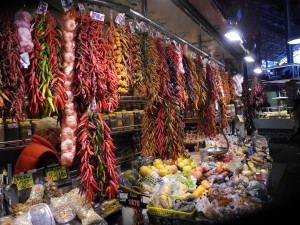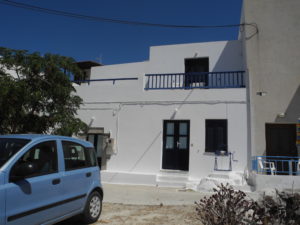
Markets like this one in Barcelona offer excellent lunch possibilities. Photo by Clark Norton
Today’s guest post, by Aussie-expat writer Brittnay, is about some ways to save money while traveling in Europe — which can be a very expensive destination these days. I’ve added my own comments after each tip, usually to expand on them a bit.
While these tips only scratch the surface of the topic, they’re all valuable ones to keep in mind while planning your next European vacation.
By Brittnay
Although travelling through Europe can be expensive, it doesn’t have to be.
We’ve put together five tips that have allowed us to visit 21 European countries in the past two years! Using these tips enable you to experience the cities and towns you visit more like the locals do — and that’s usually a good way to save money.
- Get a City Welcome Card
City welcome cards are a great way to save money while in Europe. Many cities offer them for purchase — and for a fraction of what you would pay at individual sites, they may offer free transportation all over town as well as discounts and two-for-one admissions at various tourist attractions, restaurants, and museums.
Most cities offer passes for different amounts of time so you can get one appropriate for the length of your stay. Look for the cards at Tourist Information Offices and also at individual attractions that accept the passes.
My take: This is an excellent tip, but make sure it includes some or most of the attractions you actually want to see and that you won’t end up spending more for the pass than you would otherwise (which has happened to me).
- Try House Sitting
You can actually stay in a city or town for free by house sitting. You will have to take care of someone’s home and possibly pets in exchange, but a few responsibilities make the amount that you’ll save on accommodations more than worth it.
House-sitting can also save money on food expenses since you’ll have use of a kitchen.
By signing up as a house sitter, you may even be able to plan a trip all across Europe simply by meeting the house-sitting needs of people in various countries.
It can be a complicated process to get started, so research first and see how to become a house sitter. You can reduce your cost and even have the opportunity to stay in some luxury homes!
My take: Along with house sitting, staying at an airbnb or in a rented apartment can often save you money over hotels (though not free, of course). If you’re planning to make one European city your base for an extended stay and are willing to have others stay in your home while you’re away, you can also consider a home exchange program.

Consider swapping your home for this one on the Greek island of Milos. Photo by Clark Norton.
- Eat Smarter
Dining in restaurants for three meals a day can “eat away” at your travel budget, so to speak, so look for alternatives.
If you are house sitting, renting an apartment, or staying at an airbnb and have access to a kitchen, buy food from grocery stores and farmer’s markets as often as possible to prepare your own food.
When you do go out to eat, look for small diners that will generally be cheaper than larger restaurants, and try eating your biggest meal at lunchtime when food is generally cheaper.
My take: While I agree that restaurant lunches are usually cheaper than dinners, I find that eating my biggest meal at lunchtime only makes me sleepy and less likely in the afternoon to tackle that museum I want to see or that hilly street that leads to an interesting neighborhood. So I still prefer to have my big meal at dinner, when I can relax and have a glass of wine or two as well.
While it used to be difficult in Europe to find anything other than sit-down meals for lunch, that has changed dramatically in the past few decades. You can find sandwich shops, delis, markets and any number of alternatives for picking up a lunch and, say, eating it in a park — without having to rely on American fast-food chains.
For breakfast, eat like the locals do — stand up at the counter while sipping your cappuccino and eating a pastry, and avoid sit-down charges. Or take advantage of free, bounteous breakfasts usually served at hotels and hostels in the Netherlands, Germany, and some other countries.
When looking for restaurants at any time of day, wander a few blocks away from major tourist areas to local neighborhoods and you’ll often see prices plummet.
- Walk or Bike
Transportation costs can add up quickly, so if you’re not able to take advantage of a city welcome card, then consider walking as often as possible rather than paying to take a bus or taxi.

Biking is one economical way of getting around in Europe.
Many cities in Europe are also extremely bike-friendly. You might be able to rent a bike for much less than you would pay for public transportation — so you can still get around quickly but economically. Just make sure you get a map so you don’t get lost!
My take: I agree completely.
- Plan Ahead
You might be surprised at how much money you can save simply by planning ahead.
Putting some time into planning can help you save a ton of money by finding good deals on transportation, accommodation, and even attractions.
Museums, for example, often have free admittance days, so if you want to visit one, you can plan on being there on that day and get in for free!
My take: This is the most important tip of all. If you arrive in a foreign city unprepared, you will spend more money — period.
Booking airline tickets and hotels in advance are obvious money-savers, but make sure your accommodation is within walking distance, say, of places you want to see and explore — or close to the railroad station if you’re traveling by train. (Google maps are a godsend for this.)
Know your options: you may be able to catch a commuter train or ferry, for instance, to a particular site instead of taking an expensive cab ride.
You don’t have to plan for every moment of your trip — leave room for spontaneity and making new discoveries — but planning for the basics is the best way to avoid unwanted (and costly) surprises.
Author bio: Brittnay is an Aussie who lived in London for the past two years before making the move to Dublin. Thanks to managing her budget, she managed to squeeze in 21 trips to Europe & Africa in that time (including lots of cheese & wine). Her love of travel and food is captured on The Nut Butter Hub
Note to Readers:
Due to popular demand, my book 100 Things to Do in Tucson Before You Die has currently sold out at Amazon.com, Barnes & Noble Online, and all local Tucson bookstores (you may find a copy or two here and there).
If you choose, you can place an order from Amazon, B&N, or your favorite bookstore. There will be delays until the book is reprinted.
Or, you can order directly from me at paypal.me/clarknorton; price of $19.35 includes sales tax and shipping. Be sure to send me an email at clark@clarknorton.com with your name and shipping address. We also accept checks. Thanks!
UPDATE: The reprint is in! I can now mail one or more out to you right away with your payment. And I hope that bookstores and online sites will soon receive their book shipments as well.
Thanks, everyone, for helping to make 100 Things to Do in Tucson Before You Die such a rousing success!
And Happy Holidays to all!
Best wishes,
Clark












One Response to 5 Ways to Save When Traveling Europe